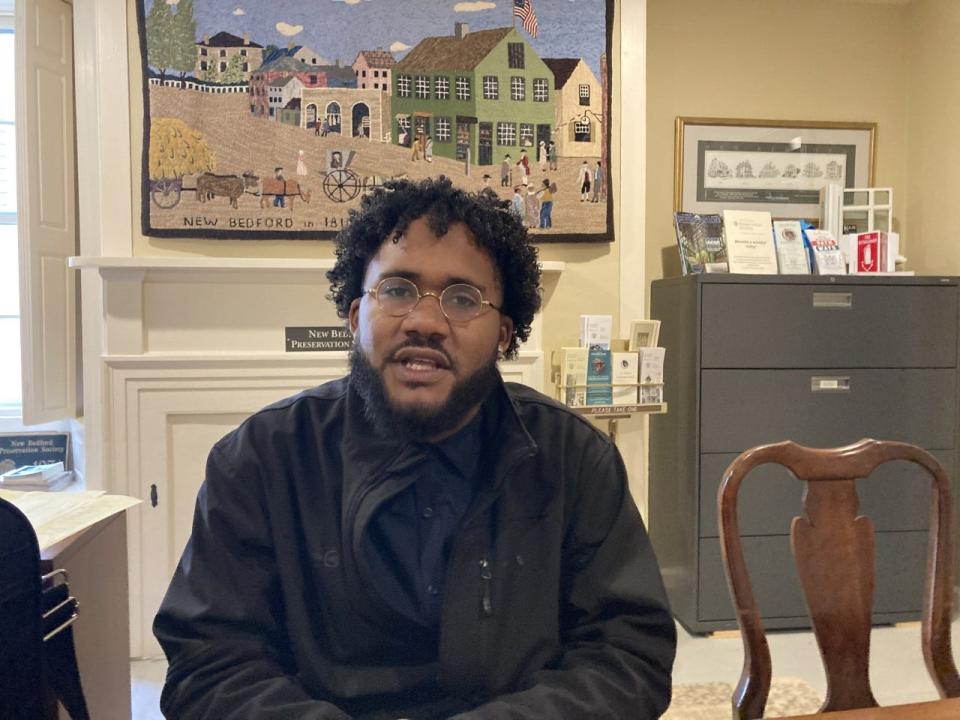WHALE has been criticized for gentrification. Eldric Abreu is on a mission to change that.
NEW BEDFORD — When 26-year old Eldric Abreu took on his new position as community outreach coordinator for the Waterfront Historic Area League he knew it was a new role for the decades-old organization.
"I've been really glad having the opportunity of being born and raised in this community to work here," he said. "A lot of displacement that comes from gentrification comes from a lack of cultural acceptance."
He said the organization, a non-profit seeking to use architecture "to enhance and economic vitality in New Bedford," intends to make sure city residents have a voice in their decisions.
"We need more representation from low-income sectors of the community in our decision-making."
The New Bedford-native, whose ancestors came from the island of Sal in Cabo Verde, did not originally intend to work in the field of housing.
In 2016, he was a sophomore a the University of Massachusetts Dartmouth, studying mechanical engineering and business administration, when he was diagnosed with epilepsy.
"It came out of nowhere," he said.
As a result, Abreu was temporarily knocked off track, but not for long. He swiftly became involved in public health when he became a research and development specialist for the City of New Bedford; a job he held from 2016 until starting at WHALE.
Growing up in the city's South End, he may not have experienced gentrification consciously, but he knew he grew up in an environment shaped by it.

Learning from the past
WHALE started about 60 years ago and developed a reputation as a gentrifier.
This was in no small part due to its work around the Central Waterfront General Neighborhood Renewal Plan, which put in place the Waterfront Connector Road and the Route 18, displacing dozens of homes — mostly of Portuguese and Cape Verdean families.
The original 1964 General Neighborhood Renewal Plan — following the then a la mode urban renewal school of urban design — called for the acquisition of almost 271 acres of land, resulting in the displacement of a large portion of the then 2,600 people living in the area.
Abreu said that the organization learned from that experience and that is why his position was created.
"The position of outreach coordinator was created specifically to get feedback from residents," he said. "It's a great way to mediate" between development and residents already in the area.
Abreu added that he is looking to expand knowledge of programs offered through WHALE and the City of New Bedford in an effort to help residents cope with the current citywide housing crisis.
Abreu said the root of the crisis comes from increased demand in housing and competition over a low supply — much of which is driven by new arrivals from the Boston area encouraged by the arrival of South Coast Rail and new flexibility from the rise of remote work.
As a result, real estate speculators purchase properties looking to renovate and rent them to more upscale markets - often leading to the eviction of long-time residents unable to afford rapidly rising rents.
"There's a lot of gentrification going on that has migrated to the city," he said.
He said that the coming changes, including the rise of offshore wind, will bring opportunities that will hopefully offset the challenges before residents.
For subscribers:From matcha eclairs to tea mocktails: New Bedford sushi bar offers full Japanese 'pantry'
"The new career market could help a lot of people's lives in New Bedford," he said.
Future development:Could Fairhaven's Route 6 parking lots help the housing crisis? It's a possibility.
New Bedford programs to avoid displacement
Abreu said he views his position as critical to helping residents avoid displacement.
"One of the key factors in avoiding displacement with development is having the involvement of the community," he said.
He added that education will be critical in helping city residents mitigate the effects of gentrification.
On the horizon:Commonwealth Wind keeps project in pipeline, asks for room in negotiations
"As someone who was been born and raised in New Bedford, I learned that there were a lot of programs available to help," he said. "There needs to be greater awareness of those."
He also said that there needs to be greater attention paid beyond downtown.
"I thought I had a pretty good historical sense of what happened and is going on in my city," before starting at WHALE, Abreu said. "I have seen a lot of money going into the renovation of New Bedford, but only in certain areas."
He said WHALE is looking at abandoned properties as candidates for renovation and improvement and that data and community input will be critical in that process.
To that end, the organization is looking to add e-newsletters in Spanish and Portuguese to the organization's communications.
"We do plan on working with any Ki'iche' speakers if we can," he added.
Abreu said WHALE is also looking to turn to the community for help in finding historical sites for preservation which can mitigate gentrification's effects.
"A lot of displacement that comes from gentrification comes from a lack of cultural acceptance," he said.
Contact Kevin G. Andrade at kandrade@s-t.com and follow him on Twitter: @KevinGAndrade. Support local journalism and subscribe to the Standard-Times today!
This article originally appeared on Standard-Times: Eldric Abreu hopes to mitigate gentrification at WHALE

